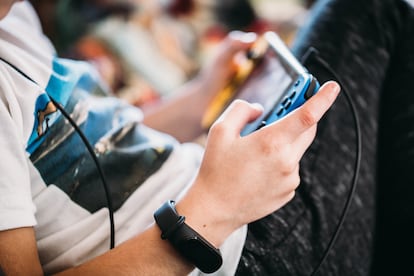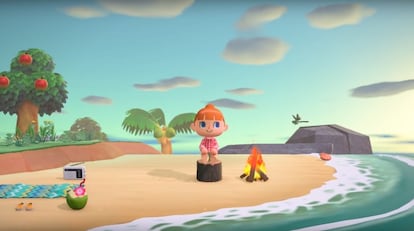Video games: A promising tool for anxiety and depression
Electronic games can help treat mental health conditions, but studies that would enable their development in a scientific environment and address possible addiction concerns are still lacking


Águeda Gómez Carbonero chose a difficult topic for her doctoral thesis in video game design and development at the Jaume I University in Spain. “I wanted to make a video game that served a purpose beyond entertainment,” she explains. The result, after a long period of work, is Horizon: Resilience, a cellphone game for people suffering from mild and moderate depression. Beginning was the most difficult part. Video games have always had a complex relationship with psychology. It’s well known that they can create addicts who end up needing clinical help, but few efforts have been made to tap into their potential to help treat mental health problems such as stress or anxiety. “They are a very powerful tool, but they are undervalued,” says Gómez, who completed her thesis with the help of a doctor in psychology.
Horizon: Resilience starts with the story of a family that has to leave their home and move to a forest, where they need to do everything from scratch. A green field and an interface similar to traditional cellphone games appear on the user’s screen. “The goal is to make the town progress by improving the resilience of its inhabitants,” explains Gómez. In order to set up buildings and attract more inhabitants, the player must earn points (called “energy” in the game) by developing four components: motivation for change, cognitive flexibility, behavioral activation (moving, walking down the street) and the promotion of positive emotions. Energy can also be obtained by answering the daily questionnaire that evaluates the psychological state of the patient/player, going to the library to learn techniques to deal with depression, or talking to the town’s residents.
More and more scientific studies support this type of games. “Overall, video game-based interventions were useful and effective in treating depressive disorders,” states a review of studies carried out in 2022 by experts from the Autonomous University of Madrid and Imperial College London. “However,” it continues, “the limited number of studies identified in this systematic review highlight that video games for depression represent a novel area of research.”
That is the same conclusion reached by other studies: certain video games, including some of the most commercial ones, can have a positive effect on people with depression, but there is not enough data to confirm this trend. It was only two years ago that authorities in the United States approved EndeavorRx, a video game that doctors can prescribe to treat children with attention deficit disorder with or without hyperactivity (ADHD)
First steps
It is difficult to determine which components make a video game suitable for patients with mental health problems. “The research is still in its infancy, and there are no studies that focus on which isolated elements are appropriate for which symptoms,” laments Gómez. EndeavorRx can be a good model: its creators say it uses sensory stimuli to stimulate specific areas of the brain that play a key role in attention. It has an algorithm that measures performance and customizes each patient’s treatment in real time, and its use is limited to 25 minutes and five days a week. In the case of minors, it has a mode in which only parents can access certain features. “The most important thing to determine the usefulness of a game of this kind is its subsequent analysis, verifying if it is really achieving the changes we are looking for in the patient,” explains psychologist Juan Antonio Román.
“Video game-based interventions do not replace psychopharmacological treatment and psychotherapeutic follow-up, which are the basis for the management of depression,” points out the study cited above, before focusing on some of the advantages offered by these tools: “they do not depend on the face-to-face counseling and are cheaper and easier to implement,” especially for “people who live in remote areas, or in areas where the number of healthcare providers is limited.”
Games like Animal Crossing, in which players have to build a town from scratch and whose popularity skyrocketed during the Covid-19 pandemic, can be beneficial for mental health, as various studies have shown. Others, like Minecraft, where users can build all kinds of structures with blocks, or Pokémon Go, which brought millions of kids onto the streets, are also mentioned.
But the world of video games is vast, and addiction is a constant threat. Most games are designed to keep the player hooked for as long as possible, and they use all kinds of techniques to achieve this. As a result, use and addiction have increased over the years. “When we are going through an emotionally tense situation, and we are looking for a way to feel better, we can end up finding solutions that are dysfunctional, such as excessive use of video games or gambling. That makes you feel better in the short term, but it has harmful effects in the long term,” explains Román.
The psychologist still does not recommend video games to his patients, but he does not see it as a remote possibility. “They have an amazing power to push us to do things that we would not otherwise do,” he says. “And they offer a clear formula for achieving goals that is very helpful, because we often try to achieve things, but the result is always uncertain. No matter how hard we try, sometimes there are many factors at play and everything is very complicated. But in games like that, the results of our actions are always very predictable.”
The calming effect of Animal Crossing
The fact that a person plays this type of video game does not necessarily mean that they have a specific pathology. “There may be a correlation. That is to say, there will be people who manage to ease their anxiety thanks to a calmer game, but there are many others who surely play to entertain themselves and don’t feel anxiety or depression,” explains the psychologist. Animal Crossing: New Horizons, for example, has been analyzed for its capability to calm anxiety. The game, one of Nintendo’s latest hits, is the focus of a study carried out during the pandemic by two researchers from the University of Singapore, who concluded that “playing the game helped satisfy various psychological needs — autonomy, relatedness, and competence — as described by Self-Determination Theory.”

“Players stopped playing the game when they found that their psychological needs were thwarted or better met through other activities,” the researchers continue. In other words, someone might play a lot for a period of time due to a certain need that arose at that moment, which can end over time. “Our findings offer support that video games can offer psychological relief in stressful contexts by providing opportunities for people to satisfy key psychological needs,” they conclude.
For now, Gómez would like to have more funding to continue developing the game, because with the money she was offered from the doctorate she was only able to develop an initial test. “More funds are needed for research. If we were given funding for this video game, it would be feasible to hire professionals or collaborate with a private company to develop these tools so that psychologists can use them in their consultations. We can’t just stay at the demo stage.”
Sign up for our weekly newsletter to get more English-language news coverage from EL PAÍS USA Edition
Tu suscripción se está usando en otro dispositivo
¿Quieres añadir otro usuario a tu suscripción?
Si continúas leyendo en este dispositivo, no se podrá leer en el otro.
FlechaTu suscripción se está usando en otro dispositivo y solo puedes acceder a EL PAÍS desde un dispositivo a la vez.
Si quieres compartir tu cuenta, cambia tu suscripción a la modalidad Premium, así podrás añadir otro usuario. Cada uno accederá con su propia cuenta de email, lo que os permitirá personalizar vuestra experiencia en EL PAÍS.
¿Tienes una suscripción de empresa? Accede aquí para contratar más cuentas.
En el caso de no saber quién está usando tu cuenta, te recomendamos cambiar tu contraseña aquí.
Si decides continuar compartiendo tu cuenta, este mensaje se mostrará en tu dispositivo y en el de la otra persona que está usando tu cuenta de forma indefinida, afectando a tu experiencia de lectura. Puedes consultar aquí los términos y condiciones de la suscripción digital.








































